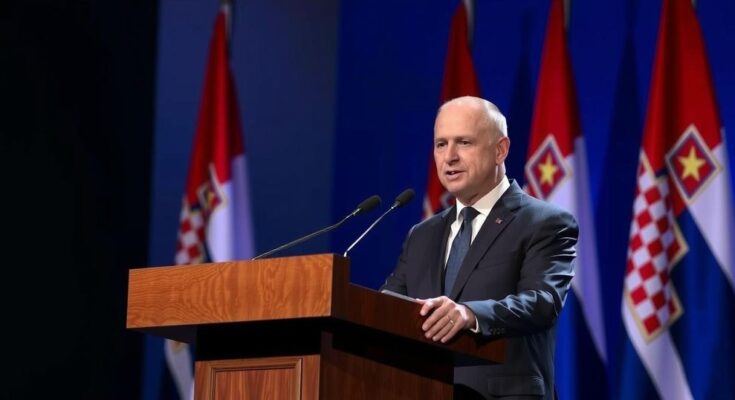Croatia will hold a presidential election on December 29, with incumbent President Zoran Milanović running for reelection. If no candidate achieves a majority, a runoff is scheduled for January 12. The election occurs amidst political turbulence, highlighted by the recent arrest of Health Minister Vili Beroš for corruption.
Croatia is set to conduct its presidential election on December 29, as announced by Prime Minister Andrej Plenković. The election will begin the process of selecting the nation’s highest office-holder, with a runoff planned for January 12, should no candidate secure an outright majority on the first ballot. Incumbent President Zoran Milanović has declared his intention to seek reelection, receiving support from the Social Democratic Party, while his principal opponent is anticipated to be Dragan Primorac from the ruling conservative faction. The political landscape is further complicated by the recent arrest of Health Minister Vili Beroš amid corruption allegations, highlighting increasing tensions within the conservative government. The election will also witness several other candidates from both ends of the political spectrum entering the fray.
The upcoming presidential election on December 29, 2023, is significant in the political landscape of Croatia, a member of the European Union. Primarily, it marks a critical moment for the ruling parties and the incumbent president to consolidate their support amid ongoing political strife. The rivalry between incumbent President Zoran Milanović and Prime Minister Andrej Plenković reflects deep political divisions, especially concerning issues like Croatia’s military involvement in Ukraine. Additionally, the political turmoil induced by the recent arrest of a key government minister over corruption allegations could influence voter sentiment and candidate support.
In summary, Croatia’s presidential election scheduled for December 29 is poised to be a highly contested affair, with incumbent President Zoran Milanović facing challenges from various candidates, including Dragan Primorac from the governing party. The elections’ significance is heightened by recent political turmoil, including corruption allegations against a government minister, which may impact the voting dynamics. The outcome of this election will be a crucial determinant of Croatia’s political direction in the coming years.
Original Source: abcnews.go.com




